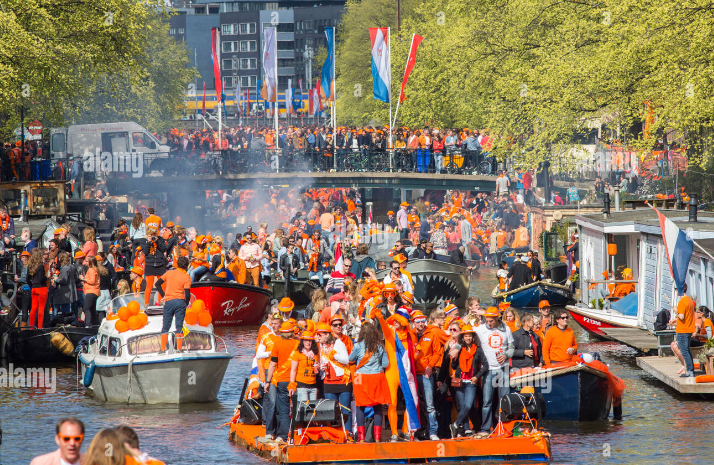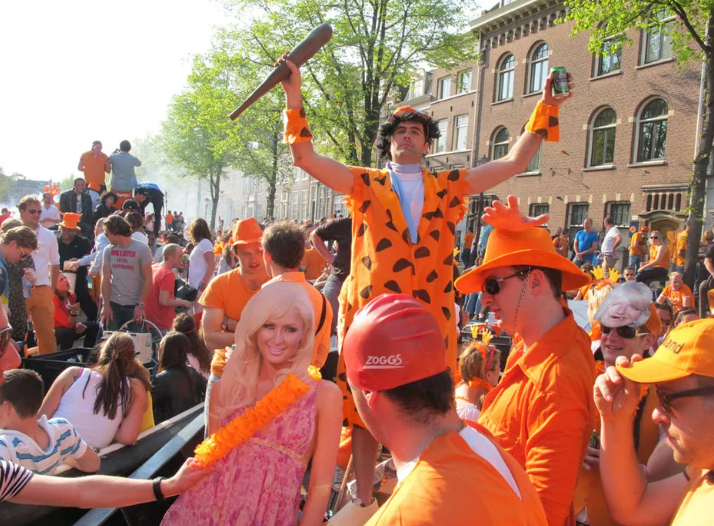In the Netherlands, Queen’s Day, known as “Koninginnedag” in Dutch, is observed annually. This holiday, which falls on April 30th, honors Queen Juliana’s birth. The enthusiasm and excitement of this day have not decreased, even in the face of changes in royalty. Princess’s Day was first observed in the Netherlands in 1885. Princess Wilhelmina celebrated her birthday on that day. This changed to Queen’s Day after she took the throne.
The Date’s Historical Development
There were multiple revisions to the date. Wilhelmina’s birthday was originally August 31. Later on, for Juliana, it was moved to April 30. The celebration changed to King’s Day on April 27, commemorating King Willem-Alexander’s accession to the throne.
customs and holidays
Queen’s Day in Netherland is about more than just the throne. The Dutch should celebrate today. Orange oceans envelop cities. This is a quick overview of normal celebrations:
- Vrijmarkt: An open “free market” where anyone can sell things nationwide.
- Streets resound with the sound of concerts and performances.
- Boat Parties: Joyous boat parades are abound throughout the canals.
- Games: Age-old favorites like “koekhappen” are enjoyable.
Background Information
Princess Wilhelmina was born at The Hague on August 31, 1880. She was the only child born to King William III and the last to survive him. Public birthday celebrations were conducted for her on August 31, 1885, and on the same date every year thereafter. Before Wilhelmina became queen in 1890 after her father passed away, the holiday was known as Princesses Day (Prinsessedag). When news spread that Queen Wilhelmina had recovered from typhus on August 31, 1902, Queen’s Day was officially observed as a national holiday in the Netherlands.
What Did People Do?
The celebrations for Queen’s Day started in the evening on April 29 in several towns and cities, especially in Amsterdam, Arnhem, Utrecht, and The Hague. There were street celebrations and open-air music events. A few of the activities carried on until sunrise, the official start of Queen’s Day festivities.
One Day Dedicated to the Shade of Orange
Why is orange? The House of Orange-Nassau is the ancestor of the Dutch Royal Family. Therefore, everyone dresses in orange on Queen’s Day. including refreshments and food!
Table, A Brief Overview of Queen’s Day
| Aspect | Detail |
| Origin Year | 1885 |
| First Celebrated for | Princess Wilhelmina |
| Original Date | August 31 |
| Current Date (as of Juliana) | April 30 |
| Main Events | Vrijmarkt, Concerts, Boat Parades, Games |
| Signature Color | Orange |
Evolution of Celebrations
Over the years, the celebrations surrounding Queen’s Day have evolved, reflecting changes in society and the monarchy. Here’s a look at how these festivities have transformed:
Shift from Royal Birthdays to National Celebration:
While Queen’s Day initially honored specific royal birthdays, it has evolved into a national celebration that reflects the spirit and unity of the Dutch people as a whole. Today, it is less about individual monarchs and more about celebrating Dutch culture and heritage.
Expansion of Festivities:
The scope of Queen’s Day festivities has expanded beyond traditional events like street parties and boat parades. Nowadays, there are a variety of activities and attractions to cater to diverse interests, including cultural performances, food festivals, and sports competitions.
Incorporation of Modern Elements:
Alongside traditional customs, modern elements have been incorporated into Queen’s Day celebrations to appeal to contemporary audiences. This includes live music concerts featuring popular artists, interactive art installations, and digital experiences.
Emphasis on Sustainability:
In recent years, there has been a growing emphasis on sustainability and environmental consciousness in Queen’s Day celebrations. Organizers are increasingly incorporating eco-friendly practices such as recycling initiatives, reducing plastic waste, and promoting sustainable transportation options.
Community Engagement and Participation
One of the hallmarks of Queen’s Day is the active participation of communities and individuals across the Netherlands. Here’s how community engagement contributes to the vibrancy of the celebrations:
Volunteerism and Collaboration:
Queen’s Day brings together people from all walks of life who volunteer their time and resources to organize and participate in various events and activities. This spirit of collaboration fosters a sense of community and belonging.
Local Initiatives and Creativity:
Communities take ownership of Queen’s Day celebrations by organizing local initiatives and creative projects that showcase their unique cultural identity. From neighborhood parades to art exhibitions, these grassroots efforts add depth and diversity to the festivities.
Social Inclusivity:
Queen’s Day promotes social inclusivity by providing opportunities for people of all ages and backgrounds to come together and celebrate. Whether it’s families enjoying picnics in the park or students organizing flash mobs, Queen’s Day fosters connections and camaraderie among individuals.
Cultural Exchange and Dialogue:
Queen’s Day serves as a platform for cultural exchange and dialogue, as people from different ethnicities and nationalities join in the celebrations. This diversity enriches the experience and promotes mutual understanding and respect.
Digital Innovations Transforming Queen’s Day

In the age of digitalization, technology plays an increasingly significant role in shaping the celebrations of Queen’s Day. Here are some digital innovations that are transforming the way Queen’s Day is observed:
Virtual Events and Livestreaming:
With the rise of virtual events and livestreaming platforms, Queen’s Day festivities are now accessible to a global audience. Organizers can broadcast concerts, cultural performances, and other activities online, allowing people to participate remotely from anywhere in the world.
Social Media Engagement:
Social media platforms like Instagram, Twitter, and Facebook have become integral to Queen’s Day celebrations, enabling individuals and organizations to share photos, videos, and updates in real-time. Hashtags and geotags help users discover and join in the conversation, fostering a sense of community and camaraderie.
Augmented Reality Experiences:
Augmented reality (AR) technology is being used to enhance Queen’s Day experiences by overlaying digital content onto the physical world. For example, AR-enabled mobile apps can provide interactive guided tours of historical sites, virtual art installations, and immersive storytelling experiences.
Digital Marketplaces and E-commerce:
The traditional Vrijmarkt (free market) has gone digital, with the emergence of online marketplaces and e-commerce platforms where people can buy and sell goods and services in a virtual environment. This allows vendors to reach a wider audience and facilitates contactless transactions.
Mobile Apps for Navigation and Information:
Specialized mobile apps are developed for Queen’s Day to provide users with essential information such as event schedules, maps, transportation options, and safety tips. These apps enhance the visitor experience by facilitating navigation and providing timely updates.
In summary
The Netherlands’ passion and zeal for life are embodied on Queen’s Day. Its origins were spurred by royal birthdays, but today the day reflects the Dutch people as a whole. It is a colorful statement of pride, harmony, and delight in the country, not just a holiday. Unavoidably, one becomes enmeshed in the festivities as towns turn into orange hotspots and canals shine with parades. Queen’s Day offers an array of experiences and recollections, whether you’re savoring orange cakes or haggling at the Vrijmarkt.
FAQs
What happens if the weather is bad?
The Dutch spirit never wavers, rain or shine. Thanks to raincoats, umbrellas, and inside activities, people guarantee that the celebrations go on.
Has there ever been controversy about the day?
Not often. The royal family was the victim of an unfortunate incident in 2009. It created a dark shadow. However, the Dutch people’s innate fortitude and cohesion won out.
What makes Queen’s Day important?
Queen’s Day goes beyond royal festivities to honor the birthdays of the royalty. It embodies the spirit of joy, unity, and pride in the Netherlands.
How are the Dutch getting ready for it?
There is a lot of preparation. Families organize picnics, cities decorate, and artists prepare for shows. A lot of them also sort things for the Vrijmarkt.

